
Arisaema is a large and diverse genus of the flowering plant family Araceae. The largest concentration of species is in China and Japan, with other species native to other parts of southern Asia as well as eastern and central Africa, Mexico and eastern North America. Asiatic species are often called cobra lilies, while western species are often called jack-in-the-pulpit; both names refer to the distinctive appearance of the flower, which consists of an erect central spadix rising from a spathe.
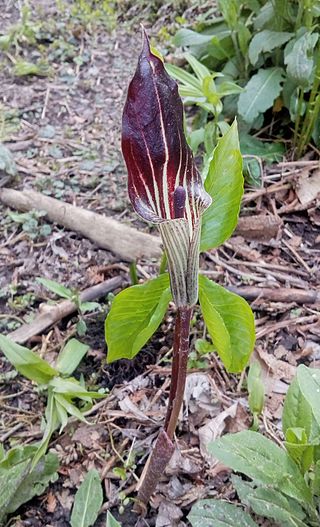
Arisaema triphyllum, the Jack-in-the-pulpit, is a species of flowering plant in the arum family Araceae. It is a member of the Arisaema triphyllum complex, a group of four or five closely related taxa in eastern North America. The specific name triphyllum means "three-leaved", a characteristic feature of the species, which is also referred to as Indian turnip, bog onion, and brown dragon.

Arisaema dracontium, the dragon-root or green dragon, is a herbaceous perennial plant in the genus Arisaema and the family Araceae. It is native to North America from Quebec through Minnesota south through Florida and Texas, where it is found growing in damp woods. It has also been reported from northeastern Mexico Plants grow 20–50 centimetres (7.9–19.7 in) tall when in bloom and after flowering reach 100 centimetres (39 in), and each grows from a corm. Normally, a plant produces one leaf with a long petiole, its leaf is composed of 7 to 13 leaflets, with its central leaflet being the largest one and with leaflets becoming smaller as they are produced distally, the leaflets are held out horizontally over the plant. During flowering in spring, a single slender, green spathe 3–6 centimetres (1.2–2.4 in) long is produced; it covers a tapering, long thin spadix. The tail-like spadix grows out around the top of its spathe. After flowering, up to 150 berries are produced in a club-shaped column. In late summer, the green berries turn orange-red, each berry produces 1 to 3 seeds. It is listed as a vulnerable species in Canada.
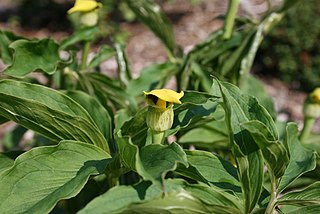
Arisaema flavum is a species of flowering plant widespread across north-eastern Africa and southern Asia. It is native to Ethiopia, Somalia, the Arabian Peninsula, Pakistan, Afghanistan, Nepal, Assam, Himalayas, Tibet, Yunnan, and Sichuan. The species epithet flavum is Latin for yellow and indicates its flower colour.
Hiroyoshi Ohashi is a botanist formerly at the University of Tokyo and Tohoku University. He began publishing on Japanese Arisaema in the early 1960s. He published a couple of miscellaneous notes on Arisaema in 1963 and 1964 and these were followed by a revision of the genus for Japan jointly published in 1980 with J. Murata, and by the Araceae treatment for the Wildflowers of Japan.

Arisaema thunbergii, commonly known as Asian jack-in-the-pulpit, is a plant species in the family Araceae. It is native to Japan, southern Korea, and Taiwan. In Japan it grows at elevations of 20–100 meters. The plant is poisonous as all parts contain calcium oxalate.
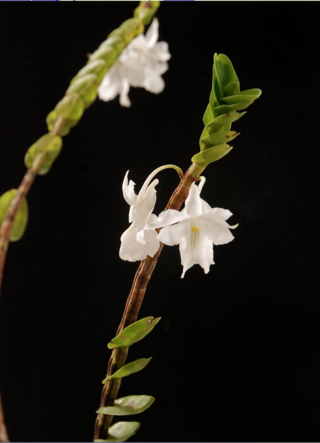
Dendrobium section Distichophyllae is a section of the genus Dendrobium.
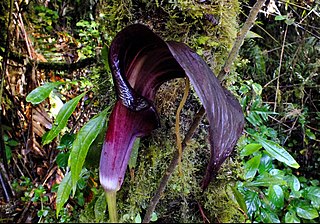
Arisaema section Anomala is a section of the genus Arisaema.

Arisaema section Arisaema is a section of the genus Arisaema.
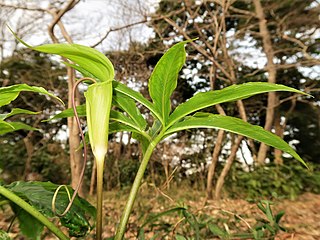
Arisaema section Clavata is a section of the genus Arisaema.
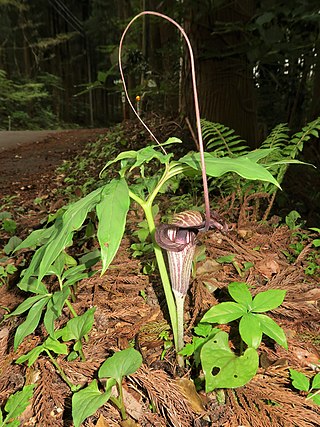
Arisaema section Flagellarisaema is a section of the genus Arisaema.
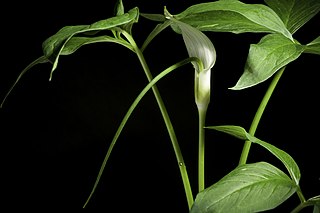
Arisaema section Odorata is a section of the genus Arisaema. This section was described in 2013 in "A nomenclatural review on the infrageneric classification of Arisaema (Araceae)" in the Journal of Japanese Botany.
Arisaema decipiens is a species of plant native to China as well as India, Myanmar, and Vietnam. It grows in evergreen forest at elevations of 600–1,600 m (2,000–5,200 ft).
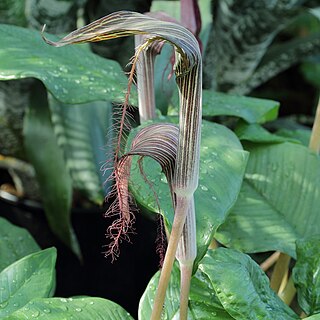
Arisaema fimbriatum is a species of Arisaema found in Thailand, Peninsular Malaysia, and Pulau Lankawi
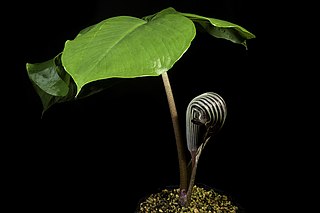
Arisaema section Franchetiana is a section of the genus Arisaema.

Arisaema section Tenuipistillata is a section of the genus Arisaema.

Arisaema section Attenuata is a section of the genus Arisaema found in tropical and subtropical habitats.
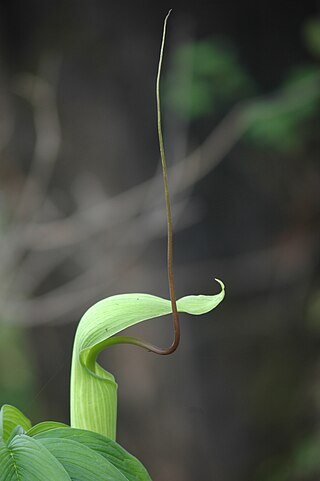
Arisaema section Tortuosa is a section of the genus Arisaema.

Arisaema section Sinarisaema is a section of the genus Arisaema.

Arisaema section Pistillata is a section of the genus Arisaema.



















